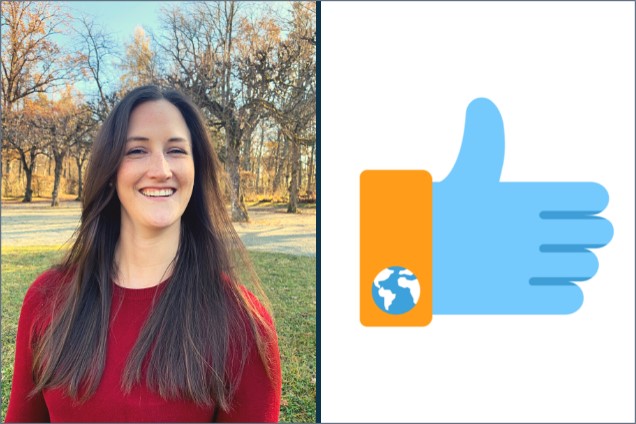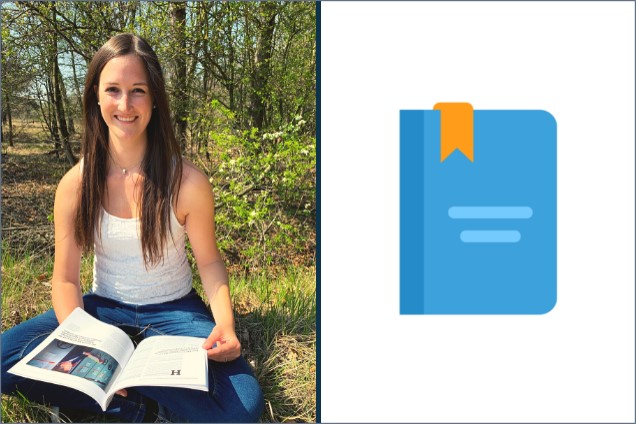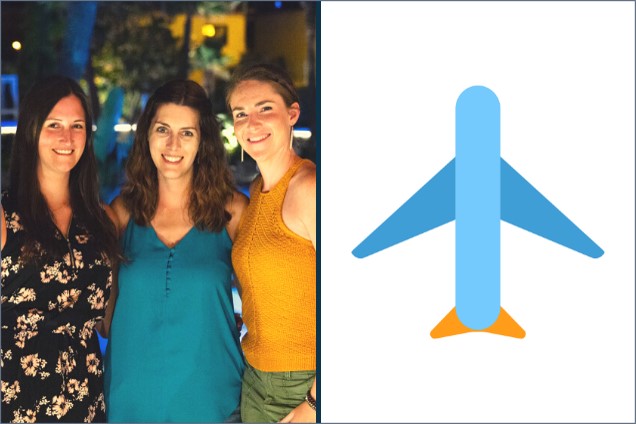In the “Alumni” series, we talk to former team members about their career change and how working at InterNations has influenced them.
In this interview, we’re talking to Caroline, who has just left the InterNations Team in order to make a long-held dream of hers come true.

You recently left your job at InterNations to launch your own PR business. So, let’s get started by briefly recapping your time in our team!
I started at InterNations in May 2017 — coincidentally, two weeks before we went on the first team trip together! I was a little scared because I didn’t really know anyone yet and had to share a hotel room with someone I’d never met. But everything went fine, and after those few days in Greece, I knew just about everyone. It was a very nice way to start a new job!
And how to summarize my four years at InterNations? I started out in a junior position, but since I already had some industry experience, I got promoted to PR Manager less than a year later. In June 2019, I became a Senior PR Manager before taking over as Team Lead Public Relations. My role changed to Team Lead Corporate Communications in February 2020 to reflect that our team is responsible for more than “just” PR. And about a year after that, right before Christmas 2020, I officially gave my notice.
Your summary makes your decision to go freelance sound rather sudden, but it actually wasn’t, was it? Can you tell us more about why you decided to start your own business?
I had always wanted to do my own thing — I just didn’t know what my “thing” would be. Perhaps entrepreneurship runs in my family. My dad is a self-employed sales manager in the insurance industry, and both my grandfathers had their own businesses. I wanted to follow in their footsteps and enjoy the same kind of freedom: I like being able to choose what to do and who to work with.
Before launching my PR business, I used to run a travel blog to help people find their ideal vacation destination based on their interests. It was my first attempt at starting a business, but unfortunately, it didn’t work out. After shutting down this website, I needed some time to accept this. But I got bored after a few months. So, I started another blog without having any concrete plans — I just wanted to write about PR in addition to my nine-to-five job. I promoted the blog on social media and happened to find my first client that way. He had come across my content and emailed me to ask if I would be okay with doing a PR project for him. And I thought, “why not?” Then I updated my website with my new services and created an online PR class — both of which led to me acquiring more clients.
I did all this while I was a full-time employee in a leadership role. Unsurprisingly, it became too much to handle, so I reduced my working hours at InterNations. Eventually, I thought it best to fully focus on my own business.
And how did you become interested in PR in the first place?
Originally, I wanted to be a journalist, so I worked as an intern and a freelancer for several local and regional publications. One of my student jobs was an internship at akzent Magazin, a magazine for the region around Lake Constance, which is where I come from. It’s a fairly small publication, so I was treated like a regular team member from day one. I even got to write a cover story, an article about a Swiss club for history nerds obsessed with the HMS Bounty.
At this magazine, I also had my very first touchpoint with PR when I was assigned to write an advertorial. This sparked my interest in public relations, which gradually deepened while I was writing a term paper about the relationship between journalism and PR. Finally, I decided to give PR a try, becoming an intern at the local government office of the City of Tübingen, with its controversial mayor Boris Palmer. Being part of his PR team for several months, I did meet him in person a few times. During this time, I also realized that I was very interested in a PR career.
PR is simply more diverse than journalism. During my jobs as a journalist, I was doing the same thing over and over again — researching, writing, and publishing. But during my PR internship, I discovered that it involved a lot more varied tasks on top of creating content, such as project management, social media, event management, building a network of press contacts, etc. That’s what I found so appealing.
My first “real” job after graduating from university was a traineeship, followed by a junior position, at a PR agency where I specialized in luxury tourism in Germany, Austria, and Switzerland. But after about two years, I was ready for something new — and that’s how I found InterNations.

So, what would you say you have learned during your PR career at InterNations?
In the past four years, I’ve learned a lot. First of all, I gained more experience in my field. When starting my travel website, I didn’t consider becoming a PR consultant simply because I wasn’t confident enough yet. But with three more years of professional experience under my belt, I’m now sure that I can support my clients in the best way possible.
It’s also thanks to my experience at InterNations that I was able to assist my first client. One of my most important InterNations projects was the annual Expat Insider survey, and the project this client approached me with was about doing the press work for another survey exploring the untapped potential of over-the-counter retailers. I was like, “Hang on, I have done a few surveys, so I know how to launch this kind of story!” And it worked out as planned — my first client eventually even offered me a long-term contract. I don’t think my first project as a PR consultant would have been as successful without Expat Insider, though.
Moreover, through being a team lead for one-and-a-half years, I also learned a lot about managing people and organizing teamwork. When I recently hired the first employees for my PR consultancy, I wasn’t scared. This can be a huge step for lots of self-employed people if they aren’t used to a leadership role. But I’ve already laid a good foundation for this kind of responsibility, which I can now build on.
And while I didn’t look after clients at InterNations, I worked with various stakeholders, for example, with colleagues from other teams and departments. I find this experience very helpful in establishing relationships with different clients.
Speaking of the Expat Insider survey, would you describe it as one of the highlights of your InterNations career? What else did you especially enjoy working on?
Expat Insider is definitely among my personal highlights. When I joined the team in May 2017, we were scheduled to publish the results only four months later, so I began working on the survey right away. The following months were rather intense, but I really enjoyed that. I also contributed a lot to Expat Insider over the next few years, helping to make it bigger and bigger, and I still think it’s among the coolest projects I’ve ever worked on. We have built good relationships with a lot of media contacts. There are quite a few journalists around the globe who will be waiting for the latest data and reach out to us with their questions every year.
To launch the survey in the media, we usually get in touch with business-to-consumer publications. But back in 2018 and 2019, we also featured a special Expat Insider Business Edition, and I supported another team with the PR outreach for this project. I found this twist to a familiar topic really fascinating. I already knew the survey inside and out, but this was a different way of looking at the data as it was aimed at business-to-business publications — an entirely different kind of media.
Internal communication is another major project I worked on, particularly during the past year, and yet another topic I’d never focused on before. Basically, I love everything new!
What exactly are you doing at your new job?
At the moment, I’m dividing my time between working with clients and creating my own online content. In addition to doing project-based work, I have now taken on several clients on a permanent basis. The exact tasks depend on the client. For some, I only handle press work, but for others, I write and edit website content, create blog articles, and manage social media profiles. Clients can also book me for one-on-one coaching sessions to discuss their PR potential and come up with a strategy.
And then there’s my online courses. I’ve already launched one PR class with several modules, teaching my audience how to do their own press work. I am planning to focus more on such online classes in the future and am currently building a “PR academy” with various classes and resources for those who would like to handle their PR on their own. I don’t just enjoy doing PR for my clients, but I also love teaching them more about it. This is something else I learned at InterNations by training a number of PR interns.

What has been the most challenging part of starting your own business?
Definitely the administrative tasks. When switching to full-time self-employment, I immediately hired a tax consultant to overcome that challenge by outsourcing some parts. And truth be told, the last year-and-a-half has been tough. I worked a lot, especially when I was still 100% employed at InterNations. I always wanted to do the best possible job, no matter who I was working for. But, even though I would describe myself as a very well-organized person, it was hard to get everything done and still remain sane. I’m curious to see how this is going to develop after leaving InterNations — I’ve now hired two part-time employees to support me with social media and content management.
What would you advise others who are planning to be their own boss?
Although it was rather stressful, I would tell them to get started while they still have their regular job. A lot of self-employed people claim it’s the other way round: if you launch your own business while working for someone else, you will never really go for it because you don’t have to succeed. I don’t agree, but then I’m the kind of person who will go for something I really want, whether I have to or not. For me, it was nice to know that I could try out different things and still have a job to fall back on. I do admit, though, that I would probably have hesitated to give up my position at InterNations if I hadn’t happened to land a major new client.
And what are you going to miss about InterNations?
Professionally speaking, I will miss working with all the experienced people who I can exchange ideas with and who can be a sparring partner for projects. So, I’m slowly trying to build a professional support network of my own. I regularly meet up with two other self-employed women to discuss our experiences and challenges.
And of course, I’m going to miss the InterNations Team a lot! I’m really wondering what my working life will be like from now on: I no longer have an office, and my employees also work remotely. At the moment, my fiancé is still working from home, but he’ll go back to the office sooner or later. I’m definitely going to miss having such great company at work — my colleagues, the daily chit-chat in the office kitchen, and our team trips.

But even though you’re no longer an InterNations employee, you’re not quite ready to say goodbye yet…
I’m actually still working for InterNations on a freelance basis, wrapping up some projects and supporting some PR campaigns, such as this year’s Expat Insider launch. Taking on InterNations as another client isn’t what I expected when giving notice, but I’m very happy about it. It’s great to stay for a while longer and have a gentle fade-out instead of just leaving everything behind. It has truly been an amazing opportunity.
Image credit: InterNations / private (Caroline Harsch)